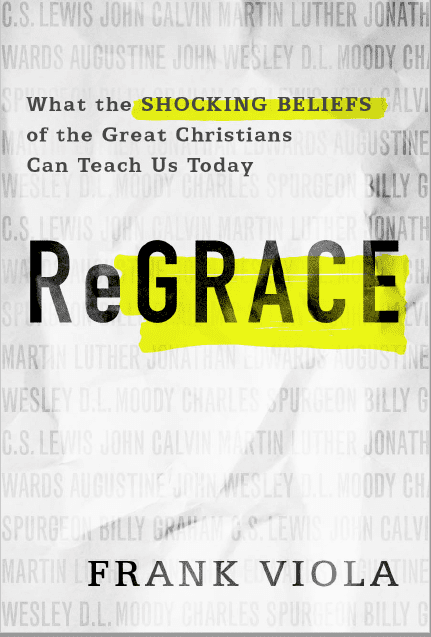What follows is an excerpt from Frank Viola’s new book – ReGrace: What the Shocking Beliefs of the Great Christians Can Teach Us Today. The endnotes which contain first-hand sources are not included in the excerpt.
WARNING: BEFORE GOING FURTHER, READ THIS FIRST
1) Some of the so-called shocking beliefs that I cover in ReGrace are beliefs that I myself agree with. Others I find abhorrent.
Consequently, just because a shocking belief is listed doesn’t reveal how I personally feel about it.
It simply means that many evangelical Christians will find the belief to be shocking (at worst) or peculiar (at best).
Therefore, to those of you who are inclined to finish this book and proudly throw your chest out saying, “Good grief, I wasn’t shocked by any of those beliefs!” remember three things:
You missed the point of the book; each person I feature had people who believed they were heretics during their day; and every one of them still have people raking them over the coals because of their viewpoints.
2) While I disagree with a number of beliefs that each person I feature held, I have respect for each of them. In fact, I cannot tie the laces of their shoes.
Each individual was remarkable in his own right. I realize this means that people who don’t like Calvin, Lewis, Wesley, Augustine, and so forth will be turned off by that statement.
And some may misuse this book as a frontal attack on each person it covers, completely missing the boat on those chapters and the intent of this volume.
Finally, remember, the point of this book is NOT to highlight what our spiritual forefathers believed. It’s simply that they all had imperfect views. For that reason, let’s have more grace and civility whenever we disagree with each other over theology and politics.
The book explains practically how to disagree – even strongly – in a Christlike manner without getting down in the mud and engaging in fleshly, carnal behavior over a diverging viewpoint held by a fellow Christian.
For if the “heroes” of the faith didn’t possess immaculate perception, than the same is true for every child of God today – including you.
—
Read Excerpt Now
The Shocking Beliefs of Augustine
A spiritually minded man will never come to you with the demand—“Believe this and that”; but with the demand that you square your life with the standards of Jesus. We are not asked to believe the Bible, but to believe the One Whom the Bible reveals (cf. John 5:39–40).
~ Oswald Chambers
Evangelical Christianity owes an enormous debt to Augustine. In fact, there’s wide consensus among historians that next to Jesus and Paul, Augustine is the most influential figure in the history of Christianity.
Even Time magazine said Augustine is “a major intellectual, spiritual, and cultural force” that continues until this day.1
So even though Augustine is considered a Roman Catholic father of the church, many Protestants claim him, including countless evangelicals.
For example, Augustine’s influence on both Calvin and Luther (and modern-day evangelicalism as a whole) was remarkable.
Even today, many Reformed theologians claim Augustine in their camp. It has been said that the Reformation was essentially a triumph and revival of Augustine’s theology.2
….
To the both of you who believe Roman Catholics should never be quoted favorably, holster your weapons. Just because I like these quotes doesn’t mean I’m headed toward Rome. I don’t ascribe to Roman Catholic theology, but I have many friends who are Roman Catholic, and some of them are among the most godly people on the planet.
That said, here are some of Augustine’s beliefs that won’t sit well with many evangelicals.
1) Augustine believed that the purpose of marriage is procreation, and that lust during sex—even among married Christians—was wrong.
In his Confessions, Augustine talked openly about his losing battle with sexual lust during his youth. At age thirty-two, he became celibate. For Augustine personally, being a Christian meant abandoning marriage. Significantly, asceticism was popular during the time in which Augustine lived.13
He believed that all sexual intercourse, even within the bounds of Christian marriage, involved concupiscence (sinful desire or lust).14
But for Augustine, celibacy was better.
Undergirding his views on this subject was Augustine’s belief that sex had but one purpose—procreation. Yet he did believe that married people who enjoyed sex without the intention of having children could be forgiven.
2) Augustine believed that the use of contraception to prevent children was perverting the purpose of marriage, “committing adultery within marriage” and “turning the bed-chamber into a brothel.”
Here’s what Augustine said about preventing the birth of children within marriage (that is, the use of contraceptives):
The doctrine that the production of children is an evil, directly opposes the next precept, “Thou shall not commit adultery;” for those who believe this doctrine, in order that their wives may not conceive, are led to commit adultery even in marriage. They take wives, as the law declares, for the procreation of children; but from this erroneous fear of polluting the substance of the deity, their intercourse with their wives is not of a lawful character; and the production of children, which is the proper end of marriage, they seek to avoid. As the apostle long ago predicted of thee, thou dost indeed forbid to marry, for thou seekest to destroy the purpose of marriage. Thy doctrine turns marriage into an adulterous connection, and the bed-chamber into a brothel.15
3) Augustine believed that if you are going to teach Scripture, you must have a knowledge of the natural world, mathematics, music, science, history, the liberal arts, and a mastery of dialectics (the science of disputation).16
This standard would rule out most Bible preachers and teachers today. Interestingly, despite his strong emphasis on the need for mastering academic subjects, Augustine could read very little Greek (the original language of the New Testament) and zero Hebrew.
Augustine speaks of an imaginary conversation with Moses, saying, “And should he speak Hebrew, in vain will it strike on my senses, nor would aught of it touch my mind; but if Latin, I should know what he said.”17
—
The above is a short excerpt from ReGrace with the endnotes removed. There’s much more on Augustine and his views in the book.
To order the book, go to ReGrace: What the Shocking Beliefs of the Great Christians Can Teach Us Today.
Here is the Back Cover Description:
The church is tired of seeing Christians act ungraciously toward one another when they disagree. Social media has added to the carnage. Christians routinely block each other on Facebook because of doctrinal disagreements. The world watches the blood-letting, and the Christian witness is tarnished.
But what if every Christian discovered that their favorite teacher in church history had blind spots and held to some false–and even shocking–views?
Bestselling author Frank Viola argues that this simple awareness will soften Christians when they interact with each other in the face of theological disagreements.
In ReGrace, he uncovers some of the shocking beliefs held by faith giants like C.S. Lewis, Luther, Calvin, Moody, Spurgeon, Wesley, Graham, and Augustine–not to downgrade or dismiss them, but to show that even “the greats” in church history didn’t get everything right.
Knowing that the heroes of our faith sometimes got it wrong will empower us to treat our fellow Christians with grace rather than disdain whenever we disagree over theology.















